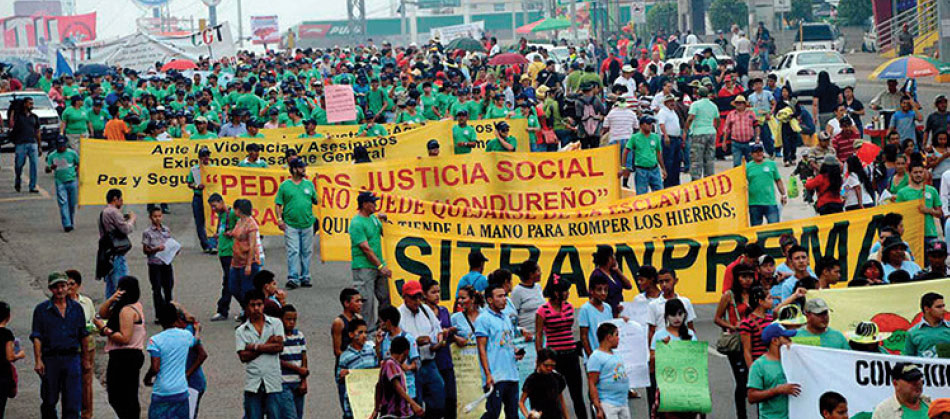
Jul 20, 2021
In Honduras, where union leaders are targeted with violence and even murdered for trying to form unions and improve workers’ lives, Darlin Oviedo, president of the apparel union SITRAJASPER (the Union of Workers of the Jasper Company), recognized the signs that he might be next.
In October, a motorcycle driver pulled alongside his motorcycle, staring at him with threatening glances, Oviedo told Solidarity Center, speaking through an interpreter. When he saw that the driver carried a high-powered weapon, he says he wove through traffic, trying to get away. The other driver followed him until Oviedo took cover at a shop. In the following months, Oviedo was followed two more times and, along with the employer’s attempts to undermine the maquila worker union he leads, Oviedo recognized he was not safe. He has since left his family for an undisclosed location.
“When people stand up to defend their rights and say there shouldn’t be any rights violations against workers, that’s when employers decide to mete out violence against union leaders like us,” Oviedo said. “I know that I lived through the first two attempts on my life but who’s to say there is not a third attempt coming at me.”
Oviedo says he and union general secretary, Selvin Peña, have been targeted since October, when workers rallied to demand the apparel factory bring back workers who wanted work after COVID-19 restrictions eased. Although the employer did call back the workers after the rally, Oviedo says the employer then began blaming all factory problems on the union, in what he says is retaliation for union success in improving worker rights on the job.
“Conditions were really difficult at the factory before the collective bargaining agreement,” says Oviedo. “But through the collective bargaining agreement, we won a really, really good contract, and that may be something the employer may not want to wholeheartedly support, so that is why they are going after the union.”
Workers Improve Job Safety with Solidarity
Forming a union at the Jasper garment factory was hard and took many years. Garment workers first created a union in 2006, but with workers facing constant employer harassment, including being fired for their participation, the union did not last. In 2016, 38 workers came together to rebuild the union and negotiate a collective bargaining agreement that covers some 2,440 workers.
Oviedo says among the many improvements, the contract restructured the occupational safety and health committee to focus on prevention, especially repetitive motion injuries that maquila workers frequently experience. The contract also ensures workers can speak up without retaliation when supervisors use abusive language, and it increased food and transport subsidies.
Oviedo took the lead in forming the new union. “When I first started at the factory, I noticed the production quota was so high, and demands so high for workers, I spoke up,” he says. “Because I spoke up about it, I was almost fired. Other workers felt the same. We started organizing quietly. They fired four of us and two of us won reinstatement.”
Challenging Anti-Union Violence
Oviedo has been active in the struggle to counteract anti-union violence since 2017, when he contacted Network Against Anti-Union Violence about physical assaults on two SITRAJASPER members and the murder of Roger Vásquez, a leader of another maquila union, SITRAGENESIS. The men were attacked as union activists participated in pro-democracy rallies in Choloma, in the Cortés department, after the presidential election.
He joined the Network’s national coordinating team and in May, the Network recognized him with an award for his union contributions and for his efforts to defend working people who have been victims of anti-union violence. Jorge Hernández at the Network Against Anti-Union Violence, honored Oviedo, and said Oviedo and his union sisters and brothers in SITRAJASPER, face “acts of intimidation and threats because of their struggle to build a more just society.”
In 2019, two union leaders in Honduras were murdered and dozens more physically attacked, threatened and harassed for their activism in advocating worker rights, according to the Network, which releases an annual report documenting harassment, retaliation and attacks against workers for their union leadership. (Read the 2020 report in Spanish.)
Despite all he is facing, Oviedo says worker victories give him hope. He cites an incident when the employer sent everyone home due to supply shortages forcing workers to use vacation time.
“We weren’t asking for vacation and that’s against the law to make us assume the cost of the business loss,” he said. “Because we were organized, we won back pay for some of the days we were home. That was a really inspiring moment for us—we saw that because we were organized we could win our rights.”
Holding Governments Accountable
Addressing anti-union violence means ensuring decent work and public safety, Oviedo says. “Economic inequality continues to widen for as long as these union campaigns are violently repressed, driving people to flee.”
The AFL-CIO is urging creation of a Central American regional migration framework that “centers on human rights, protects and empowers workers, safeguards the environment, and produces positive labor market outcomes for all working people.”
Further, the federation proposes aggressively enforcing labor standards under the U.S.-Central America Free Trade Agreement (CAFTA), and reopening CAFTA negotiations to improve and update its labor standards and enforcement mechanisms to align with the higher standard set under the U.S.-Mexico-Canada Trade Agreement.
“Right now we’re living through a moment of a lot of tension between workers and the company,” says Oviedo. “We must stand up to them because it’s our right. I have had to relocate to maintain my safety, but it is because it is our right to decent work.”
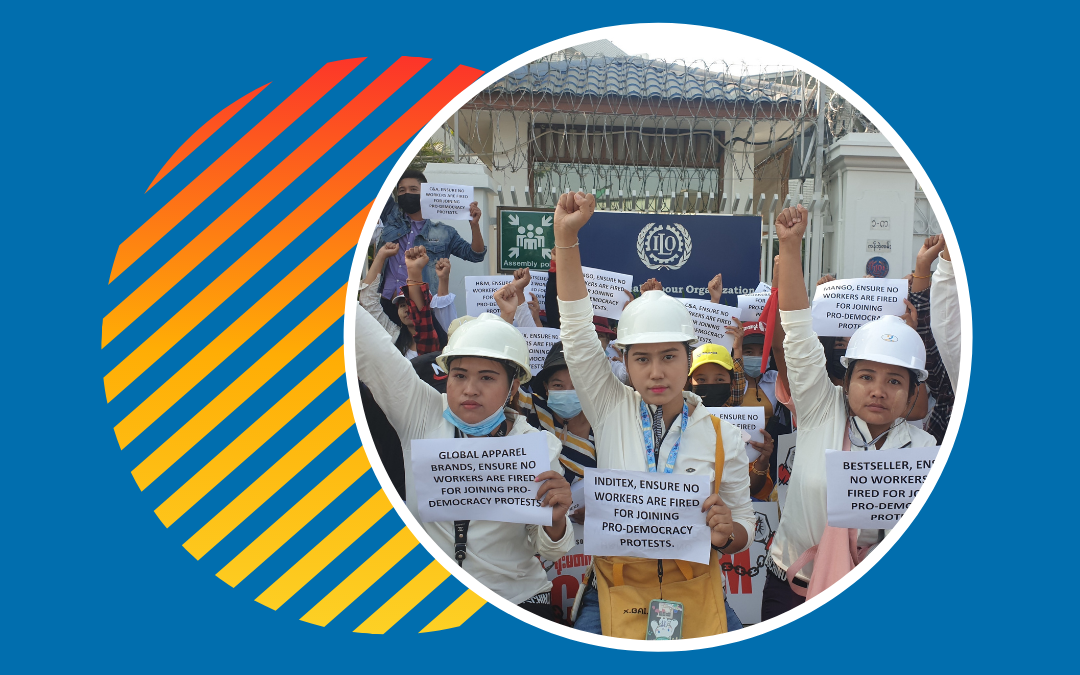
Jul 14, 2021
After the military overthrew Myanmar’s democratically elected government in February, the country’s garment workers, most of them young women, were the first to stand up to defend their right to a free and peaceful society. Since then, workers have led peaceful protests for a return to democracy—often met with violent repression, evictions, arrest warrants and prison.
Nearly 1,000 people have been killed and at least 5,000 arrested, most tortured in prison, forcing many workers and union leaders to flee. Because of their important role in standing for democracy, the government banned unions.
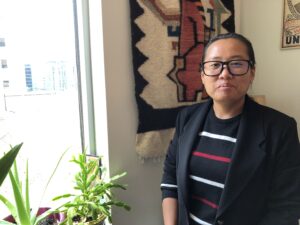
CTUM Assistant General Secretary Phyo Sandar Soe is standing with workers across Myanmar in a peaceful struggle for democracy. Credit: Solidarity Center/Tula Connell
In a special Solidarity Center summer podcast episode, host Shawna Bader-Blau, Solidarity Center executive director, talks with Phyo Sandar Soe, assistant general secretary of the Confederation of Trade Unions-Myanmar.
Speaking from a safe house, Sandar, a former garment worker, tells Bader-Blau that as multinationals begin to reopen in Myanmar, workers have no rights on the job without unions—including to be paid. The international community can truly help workers fighting for their rights by staying out of the country, she says. (Listen to the full interview.)
“If you invest in Myanmar, your investment money will go to the military regime,” Sandar says. “And then the military regime, with your money, they will keep controlling the country and they will buy guns and weapons, and then they will kill us.”
Like many union leaders, Sandar has her passport revoked to prevent them from leaving the country while they are being hunted by the regime. Despite the repression and personal danger, Sandar says when workers join together, they are strong.
“We are facing a bloody crackdown, but all people protect each other. We are finding solutions to fight back. That’s why I want to tell our brothers and sisters to endure this duration because we have very high motivation to fight back against the junta.”
Support Workers in Myanmar!
• Donate to a fund set up by the U.S.-based Asian Pacific American Labor Alliance. Your donation will go to those who have lost jobs and are struggling to survive because they stood up for a peaceful return to democracy. The link is available in the podcast notes for this episode.
• The International Trade Union Confederation is sponsoring a strike fund for workers in Myanmar.
Download Season One Episodes
The Solidarity Center Podcast, “Billions of Us, One Just Future,” highlights conversations with workers (and other smart people) worldwide shaping the workplace for the better.
Check out the full first season of The Solidarity Center Podcast and stay tuned for season two this fall!
This podcast was made possible by the Ford Foundation and the generous support of the American people through the U.S. Agency for International Development (USAID) under Cooperative Agreement No.AID-OAA-L-16-00001 and the opinions expressed herein are those of the participant(s) and do not necessarily reflect the views of USAID/USG.
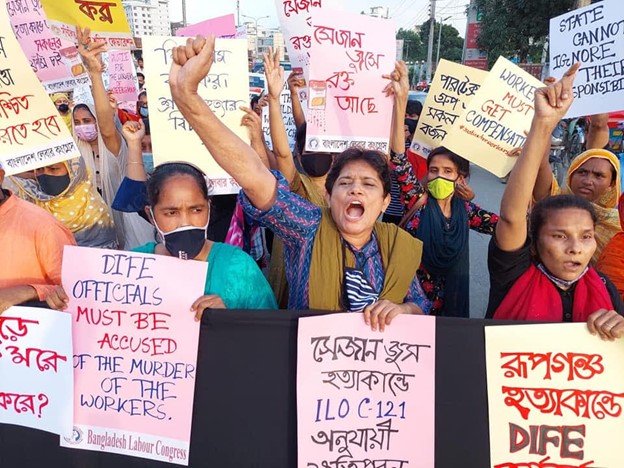
Jul 14, 2021
Worker rights advocates and the international human rights community are expressing sorrow, disbelief and outrage over the horrific fire at the Hashem Foods Ltd., factory in Bangladesh that killed at least 52 workers and more than a dozen children early this week. News reports say factory exits were locked, trapping the 200 workers inside. Three workers died jumping from the burning building.
“We believe that the fire has occurred as a result of non-compliance with law and safety regulations of the institution. This amounts to murder committed by the factory,” three major union federations said in a statement. Chemicals and flammable substances like polythene and clarified butter contributed to the blaze in the factory, and made it more difficult to bring under control, according to CNN.
The Bangladesh Garments and Industrial Workers Federation (BGIWF), Bangladesh Independent Garment Workers Union Federation (BIGUF) and Bangladesh Center for Workers Solidarity (BCWS) went on to call on the government to immediately investigate the cause of the fire and to provide fair compensation to those injured and to the families of those killed.
The owner and several top officials at the factory, owned by Bangladeshi conglomerate Sajeeb Group’s subsidiary Hashem Foods Ltd., have been arrested on murder charges. Some 2,035 people work in 11 factory buildings of Hashem Foods, which produces juice drinks, cookies and other snacks.
The fire amounts to “premeditated murder,” says Nahidul Hasan Nayan, general secretary of the Sommilito Garments Sramik Federation (SGSF). “Workers whose sweat has built palaces lost their lives due to the greed of owners, their lack of accountability, irresponsibility, brutality and lack of safety at work. We demand the culprits to be brought to swift justice.”
Bangladesh Accord Must Be Renewed
Worker rights advocates say the Hashem factory fire highlights the need for multinational brands to renew the Accord on Fire and Building Safety in Bangladesh, a landmark agreement that made factories safer for 2 million garment workers. Signed by fashion brands and unions in 2013, the Accord was set apart from previous safety agreements because it was legally binding, providing a key enforcement mechanism for workers and their unions to hold individual brands and retailers accountable.
The Accord was set to expire May 31, but corporate brands agreed to a three-month extension to allow for more time to conclude negotiations on a new binding safety agreement. Global union leaders and human rights activists say the Accord must also be expanded beyond fashion brands.
“While huge strides have been made in the garment industry safety—thanks to the Bangladesh Accord—it is a reminder that without robust and independent systems to enforce safe working conditions, the very worst can happen,” says UNI Global Union General Secretary Christy Hoffman.
Workers say that through their unions, they are able to advocate for safe working conditions without fear of being disciplined or even fired. As with the 2013 Rana Plaza collapse, that killed more than 1,100 garment workers, and the 2012 Tazreen factory fire that killed more than 112 garment workers, those at the Hashem Foods factory did not have a union to help them fight for a safe workplace or ensure children were not employed.
Says Chandon Kumar, BIGUF president: “Government agencies create investigation committees just for show. How come they did not see child labor and insufficient fire protection? We must have the right to form unions, democratic process and the freedom to speak up.”
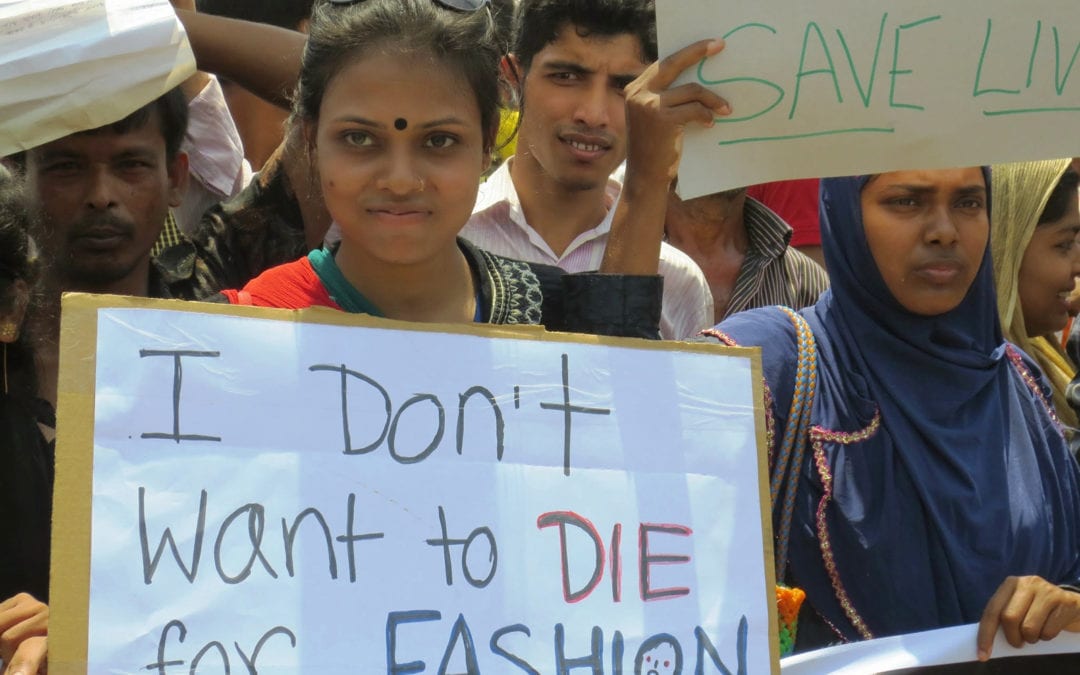
Jun 16, 2021
Jesmin Begum, a Bangladesh garment worker in her early 30s, died as she and hundreds of others rallied for unpaid wages in one of Dhaka’s Export Processing Zones (EPZs).
A sewing operator, Begum was laid off in January from Lenny Fashion, Ltd., after the factory closed. Although management said it would pay unpaid wages by May, the company never fulfilled its commitment, and workers gathered at the Nabinagar-Chandra highway outside the EPZ June 13 to demand payment.
When the workers at Lenny Fashion Ltd. and another factory that was closed by the same company refused to move from the road after two hours, the police used tear gas, rubber bullets and water cannons to disperse them, and Begum died after she fell fleeing the police violence. Dozens of workers also were injured.
“We are always told that in EPZ factories, BEPZA [Bangladesh Export Processing Zones Authority] enforces workers’ rights properly and vigorously, but BEPZA, as in many other previous cases, has miserably failed here that led to the workers’ protest and death of Jesmin,” says Babul Akhter, president of the Bangladesh Garment and Industrial Workers’ Federation (BGIWF)
Worker Rights Abused, EPZs Make Billions
Bangladesh’s eight EPZs received $333.38 million in foreign direct investment and made $7.52 billion from exports in the 2018–2019 fiscal year. Yet Bangladesh workers in EPZs face daunting odds in trying to redress often poor and dangerous factory safety and health conditions, retrieve unpaid wages or end abusive treatment by supervisors because the zones are exempt from the country’s labor laws and workers are prohibited from forming unions.
As a result, they are particularly vulnerable to worker rights abuses. Although they are allowed to organize and form workers welfare associations (WWAs) at their factories, the WWAs do not have the same rights as unions. The ILO Committee of Experts has identified numerous provisions in the WWAs that violate ILO Conventions 87 and 98 on the freedom to form unions an bargain collectively.
The terms and conditions of service for EPZ workers are regulated by BEPZA, essentially eliminating collective bargaining. Labor inspectors are not permitted to inspect factories in the zones and, unlike workers covered under the nation’s labor laws, workers in EPZs do not have the legal right to file a case challenging illegal termination.
In addition, says Akhter, “BEPZA and the employers are systematically dissolving the worker welfare associations in EPZ factories to eliminate any kind of voice of the workers in the workplace.”
With Unions, Workers Advocate for Safe Jobs
Although the government of Bangladesh in 2019 amended the EPZ law with the aim of bringing it more in line with its labor laws and international labor standards, the ILO found the new EPZ Law failed to address the vast majority of these concerns. “Importantly, the new law continues to deny EPZ workers the right to form or join a union,” according to the ILO.
“The EPZ workers must be allowed to exercise their rights to join union of their own choosing, removing the discrimination between the EPZ and non-EPZ workers,” Akhter says.
Without the ability to form unions, garment workers cannot collectively push for safety and health improvements at their workplaces. After more than 1,200 garment workers died in two tragic factory disasters in 2012 and 2013, unions have been a key partner with fashion brands in the Accord on Fire and Building Safety in Bangladesh, a landmark agreement that made factories safer for 2 million garment workers. Worker rights advocates are urging extension of the Accord, which expires in three months.
Yet the BEPZA did not allow the Accord to inspect any of the EPZ factories—all the more reason, worker advocates say, garment workers must be able to form union and collectively bargain.
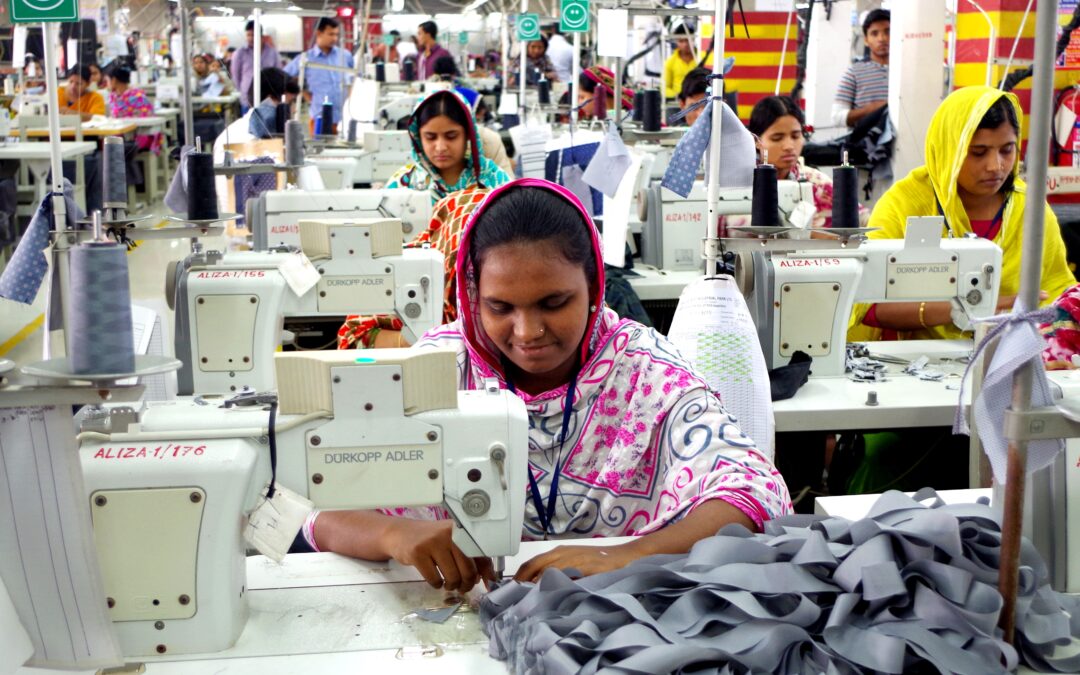
Jun 8, 2021
Worker rights and human rights advocates are urging multinational corporate fashion brands to commit to a binding successor agreement that will continue the pathbreaking work of the Accord on Fire and Building Safety in Bangladesh, a landmark agreement that made factories safer for 2 million garment workers.
Signed by fashion brands and unions in 2013, the Accord was set apart from previous safety agreements because it was legally binding, providing a key enforcement mechanism for workers and their unions to hold individual brands and retailers accountable. As a result, the Accord “has been the most successful safety program in the contemporary history of apparel supply chains,” according to a recent report by a coalition of worker rights organizations.
It was set to expire May 31, but corporate brands agreed to a three-month extension to allow for more time to conclude negotiations on a new binding safety agreement.
Accord Boosted Safety for Millions of Workers
The Accord “actively engaged with unions to ensure that workers voices are heard in the remediation process to ensure safety in the workplace,” says Rashadul Alam Raju, general secretary of the Bangladesh Independent Garment Union Federation (BIGUF).
“In five years, thousands of fire, building and electrical hazards were fixed in the [ready-made-garment] RMG factories,” he says. “As a result, safety standards were uplifted for millions of workers [and] the country has not witnessed any major accidents or loss of life in the factories inspected by Accord.”
The Accord, which now includes more than 190 brands and covers 1,600 factories, was signed after more than 1,100 garment workers were killed in the April 2013 Rana Plaza collapse in Bangladesh. Voluntary programs, with no legally binding enforcement like the Accord, failed to prevent the Rana Plaza collapse or the tragic Tazreen Factory fire that killed more than 100 Bangladeshi garment workers a few months earlier.
Accord Ensured Workers, Their Unions a Voice

BIGUF General Secretary Rashadul Alam Raju says the Accord ensured safety for millions of workers and must be extended. Courtesy Rashadul Alam Raju
Following a 2020 Bangladesh High Court decision, the Accord’s day-to-day operations were handed over to the Ready-Made Garment Sustainability Council (RSC), comprised of brands, factory owners and global and local unions. But the RSC is not legally binding and, “for all intent and purposes, is not going to bring about any real change in the factory conditions,” says Raju.
Crucially, the Accord supported an environment in which workers’ voices could be heard through collective bargaining between unions and employers, enabling unions to protect workers’ safety and ensuring they woud not be targeted by managers for speaking out about their workplace rights.
“The Accord was very much proactive in engaging with the unions in its work to ensure safety for the workers,” says Raju. “This also ensured protection to the workers and unions from being victimized by the employers. But such protection with RSC is virtually non-existent.”
Bangladesh garment workers, primarily women who often are subject to brutal verbal and even physical violence for supporting unionization, were able to form dozens of unions in the wake of the Accord, with tens of thousands achieving first-ever rights on the job.
Raju and other Bangladesh union leaders say the Accord’s signatory brands must agree to a new binding safety agreement that ensures safe work, remains individually enforceable upon brands, keeps an independent secretariat in place that oversees the brands’ compliance and allows for expansion to other countries.
Although brands committed in January 2020 to negotiate a new binding agreement with the option to expand to other countries, they since have offered only a watered-down version of the Accord.
A renewed agreement is urgently needed, union leaders say, because much work still must be done to ensure factory safety in Bangladesh and around the world. A renewed agreement offers the possibility of expanding factory safety and health to other countries, where recent disasters underscore the need to address life-threatening work environments.
The bottom line, says Raju, is that unions must be part of any new agreement, “but it has to be legally enforceable.”







